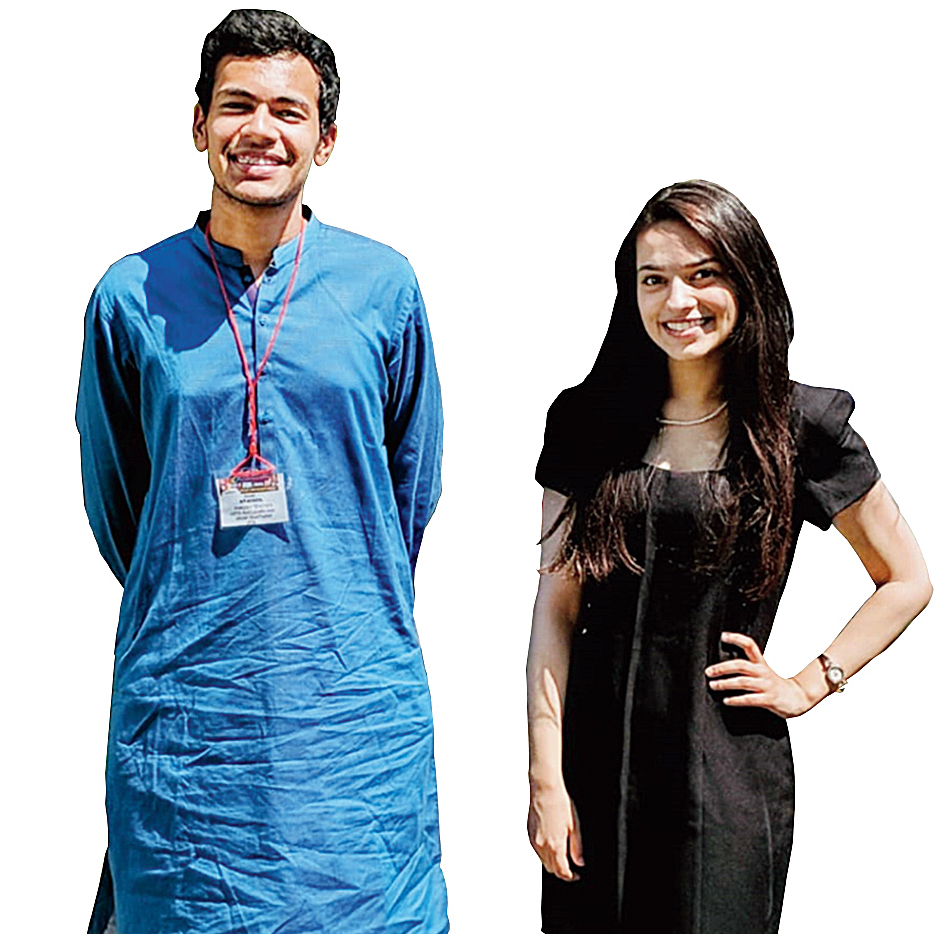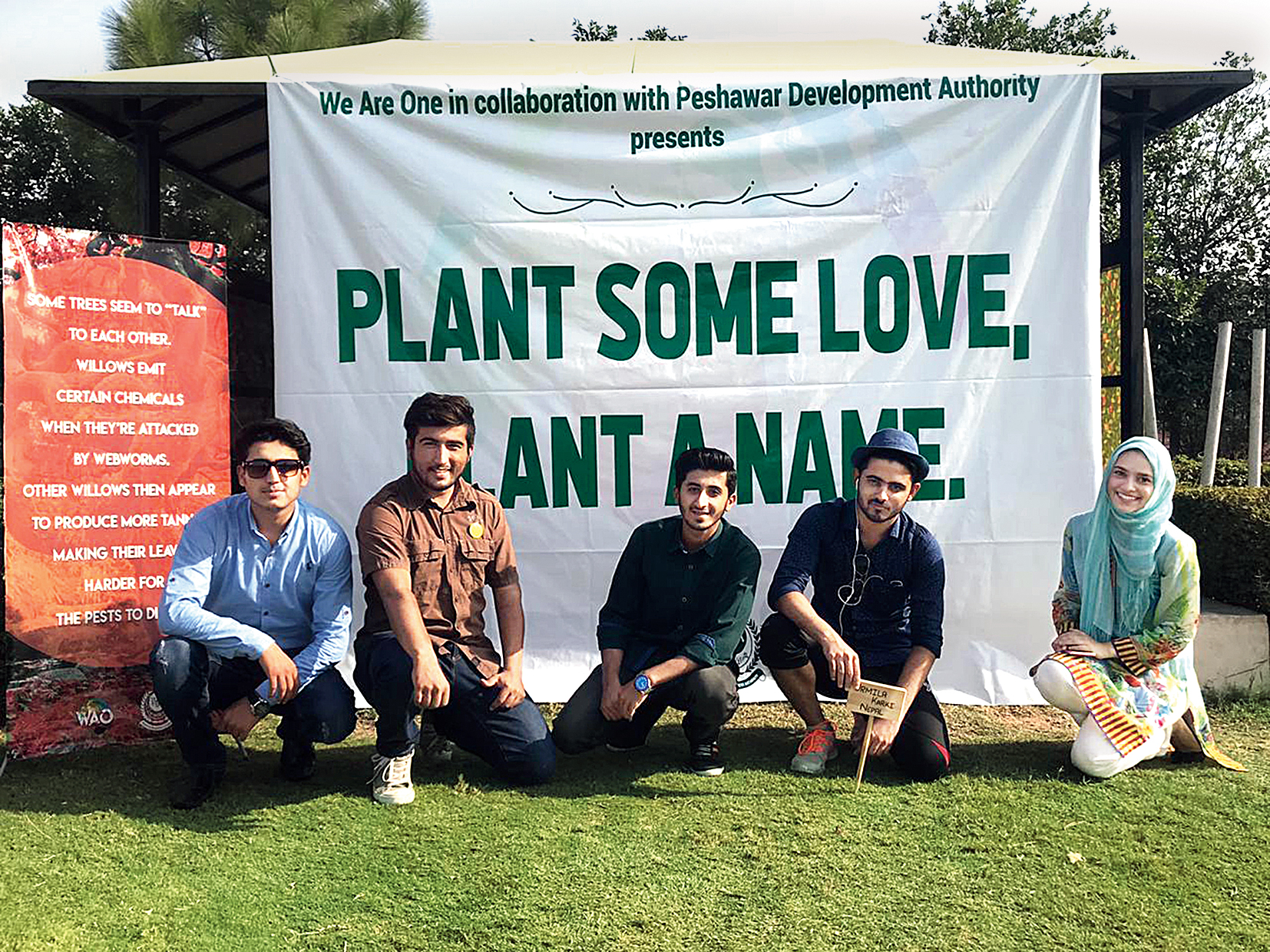In the parochial, bigoted, divisive air that pervades around us comes a fresh breath. Two youngsters have rushed in where even veterans fear to tread. Kanishk Saraogi from Calcutta and Rida Khalid from Peshawar in Pakistan are idealists driven by a strong desire to change the world and spread peace and friendship.
The two college students have started an organisation that uses the power of the Internet in a positive way, allowing people from all over the world to make friends and promote peace and harmony. We Are One, or WAO (pronounced “wow”) as they like to call it, was launched in June 2018 and already has a core presence in eight countries and participants in 22 others around the world. “WAO aims to make people realise that you don’t need to hate people of different countries and religions simply because you don’t know them. The best route to friendship between communities is interaction, which automatically brings understanding that they are just like you and we really are all one,” said Kanishk, the earnest third-year BCom student of St. Xavier’s College, Calcutta.
Kanishk had his epiphany when he was volunteering in Turkey last year with AIESEC, the world’s largest youth-run NGO. “I applied to AIESEC at the end of my first year and was selected as a global volunteer to teach in a school in Turkey. But for some strange reason, my visa was rejected seven times. I felt very dejected and thought it was not meant to be and left it God,” said the 20-year-old. On the eighth attempt, a delighted Kanishk got the visa and he set off for the city of Bursa in northwestern Turkey — his first trip anywhere outside of Calcutta on his own.
When he landed in Istanbul, he discovered he was too late for the project he had been assigned and it might take some time for AIESEC to find him another one. “I suddenly found myself homeless in a foreign country as AIESEC makes all the arrangements for your stay and food when you are on a project. I decided to carry on to Bursa anyway but was scared about how I would survive until I got another placement.”
In Bursa, he met up with the 16 volunteers who were on the project he was meant to be on. The only other person from India was Shoaib Khan from Hyderabad. Without batting an eyelid Shoaib offered to share his room with Kanishk, sleeping on the floor and giving Kanishk his bed.
Two Pakistanis, Hamza and Abdul, shared their meals with him. “Until then I had never met any Pakistanis, or even had an Indian Muslim friend. Shoaib’s selfless gesture gave me goosebumps. He broke for me the Muslim stereotype created by the media, history books and political parties in India,” said a visibly moved Kanishk.
“Abdul and Hamza’s kindness smashed the stereotypes about Pakistanis. We spoke at length about why there was so much hatred between the two countries when we had so many similarities. We have to put the past behind us and bury the hatred. It cannot define another generation,” said Kanishk emphatically.
In the last week of his 35-day stay in Turkey, Kanishk met Rida, a young girl who had just arrived for her volunteering stint with AIESEC. They talked for hours and realised they were kindred souls. The two of them shared the same views about removing misconceptions Indians and Pakistanis have about each other. “Kanishk came up with this amazing idea of starting a peace project and we decided to name it Souls of India and Pakistan (SIP). The response we received from people from both sides was overwhelming,” said Rida from her home in the North-West Frontier Province, a conservative part of Pakistan.
In October 2017, SIP was launched and the co-founders began spreading the word through their friends back in their respective countries. In less than two months, they had managed to get more than 50 Indians and Pakistanis talking to each other on a WhatsApp group, sharing their lives and building friendships. Through SIP, they began to get actively involved in social work in both India and Pakistan. “By talking, you get rid of misconceptions and neutralise hatred. In this age of instant communication, it is essential to use it to make positive changes,” said Kanishk.

(Left) Kanishk Saraogi and Rida Khalid, the co-founders of We Are One, in Romania Image: The Telegraph
In June 2018, Kanishk and Rida went to Bucharest in Romania for another AIESEC project and it is here that the seeds of WAO were planted. “Kanishk came up with the idea of expanding our peace project to other countries and working on international peace and harmony by collectively doing social work,” explained Rida. “WAO can be a platform for the youth of any country to share their ideas and work on many different projects. We want to work as citizens of the world and not just for India and Pakistan,” Rida added.
“If we can connect Indians and Pakistanis and break down barriers, we can connect everyone in the world,” said Kanishk, optimistically.
Rida and he started with their AIESEC friends to spread the word about WAO and today they have members in India, Pakistan, Turkey, Nepal, Romania, Sri Lanka, Bangladesh, Nigeria, France and Egypt. The recently launched We Are One Facebook page has 6,000 followers and counting.
On September 30, WAO held its first international event — a tree planting drive with a twist. “We decided to match up all the volunteers with international planting buddies. Through these partners, you could plant a tree in your name or in the name of someone you love on foreign soil,” said Kanishk, who likes to think out of the box and wants to be a social entrepreneur.
The tree planting volunteers had to first register on the WAO website and give three adjectives to describe their personalities. Kanishk and Rida then meticulously sifted through all the applications and paired people on the basis of these adjectives. One week before the event, they had 250 matches across 23 countries. They put all the “buddies” on a WhatsApp group and allowed them to follow up independently thereafter.
“The response was overwhelming. A teacher from St. Xavier’s College donated 100 saplings and all the volunteers from Calcutta planted them at the Garia Kalyan Samiti Club,” recounted Kanishk, excitedly. On the same day, Rida held her tree planting event, partnering with the Peshawar Development Authority and managed to get three chief guests — a Muslim, a Hindu and a Sikh — in attendance.
All the other buddies also synchronised their tree planting despite being in different time zones.
Even as WAO is planning its next international event, both Kanishk and Rida have been doing social work in their own cities. During Durga Puja, Kanishk distributed food at Kalighat and Park Circus metro stations, and Topsia. On Diwali, he held a mela for underprivileged children from the slums of Ballygunge and Narkeldanga. He managed the money for these programmes from crowd-funding, donations and very supportive parents.
Though WAO is still a fledgling organisation its aims are lofty. “Anyone who wants to make an international friend can contact us and we will link them up safely after stringent vetting. If anyone wants to start a social programme anywhere in the world, we will help them set it up,” promised Kanishk.
“My trip to Turkey made me realise that people all over the globe are the same, and we can touch everyone’s heart with love, no matter what the colour of skin, language or religion. All we need to do is communicate,” said Kanishk, who is wise beyond his years. Meantime, WAO continues to grow like the saplings its members have planted.
